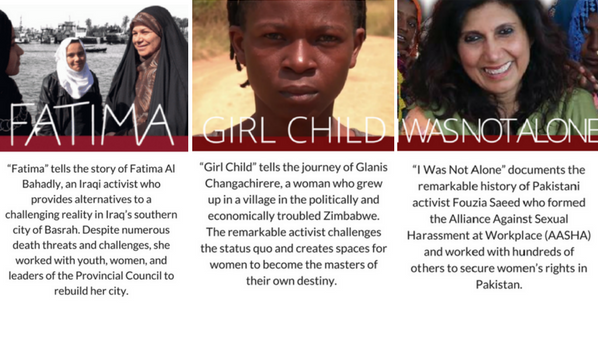Happy International Women’s Day!

This year, International Women’s Day marks a pivotal time for women’s rights movements that have captivated the international community and spurred action around the globe. From Ghana, to Pakistan, to Argentina, social media movements mobilized women to combat sexual harassment, speak out about violence against women, and run for political office in historic numbers.
The #MeToo movement took off around the world and empowered women to open a new dialogue concerning violence against women. The hashtag spread to over 85 countries and morphed into a number of parallel campaigns: #YoTambien in Spain, #NiUnaMenos in Argentina and Latin America, #BalanceTonPorc in France, وأنا_كمان# in Arabic-speaking countries, and #QuellaVoltaChe in Italy. Over the past year, these social media campaigns have translated into real movements for change, with women demanding transparency and accountability from their governments, places of work, and communities.
Bolstered by this recent wave of engagement, our partners’ long-term initiatives can further thrive and expand to new audiences. In Côte d’Ivoire, the National Democratic Institute (NDI) continues to hold important conversations to combat how violence is used to “control, intimidate, or punish women simply for daring to engage” in politics through its “No Party to Violence” program and its global #NotTheCost campaign. In Nepal, Women LEAD promotes civic and political leadership among young women in Nepal, hosting an annual conference to allow young women to network and engage with experienced female leaders from different sectors of society. In Ghana, the Gender Centre for Empowering Development (GenCED) continues to push for the immediate creation of a ”Domestic Violence Support Fund” to aid victims of gender violence.
Empowered by these programs, women have already begun taking steps to close the gender imbalances in political institutions and parties. In both Kenya and Albania, record-high numbers of women were elected in 2017, with 29% more women running for office in Kenya and a 10% increase in the number of women elected to office in Albania. In the United States, reports show that the number of women running for office has doubled since 2016.
However, as we celebrate the accomplishments of these transformative programs, we must acknowledge that, in other parts of the world, women are still largely underrepresented in the political space. The World Movement will host at the upcoming Ninth Global Assembly in Dakar, a workshop to address the systemic barriers women face when they enter public life. By facilitating discussions and bringing together intergenerational voices, the participants will develop strategies for fighting to overcome these repressive environments. Without equal and meaningful engagement of women in political and civic spaces, democracy cannot be considered truly representative. The strides made in the past year show us a path forward, and we must work together to continue to build on this momentum in those to come.
______________________________________________________________________________________________________________________________________
In our “Faces of Civil Society” film series, we documented three women—Fouzia, Glanis, and Fatima—who challenged the status quo to create opportunities for women in future generations to engage more freely with civic and political spaces. Click here to hear their stories.

